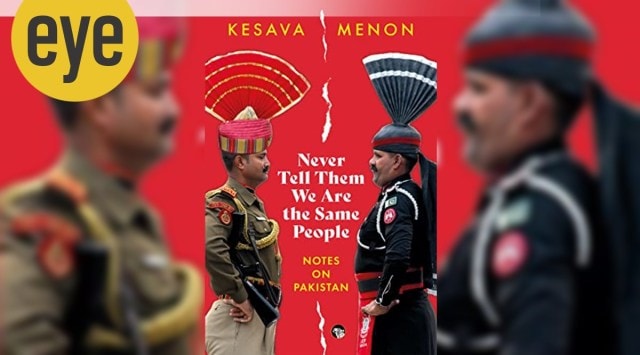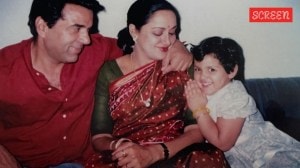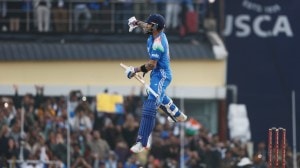Kesava Menon’s Never Tell Them We Are the Same People is a foreign correspondent’s reflections of his time in Pakistan
The question of identity and the looming 'other' that is India, and the Pakistani state's deliberate efforts to define itself from the start as 'not India' forms a big part of the book.
 Never Tell Them We Are The Same People: Notes on Pakistan, Kesava Menon, Speaking Tiger, 256 pages, Rs 399. (Source: Amazon.in)
Never Tell Them We Are The Same People: Notes on Pakistan, Kesava Menon, Speaking Tiger, 256 pages, Rs 399. (Source: Amazon.in)Reading this book was part deja vu, part envy. Kesava Menon was The Hindu’s correspondent in Pakistan in the early 1990s. That was a time that Indian journalists were not restricted by three (later one) city-limited entry visas. Menon’s recall of his visits to Swat and Mohenjo Daro was for me a recollection of rejected requests to travel to various places of interest in Pakistan, all in boiler-plate sarkarese. But the story of Menon’s three-decade-ago Pakistan assignment was also replete with moments that mirrored mine some15 years later – including the house that he lived in, though the landlord, the rather colourful Sajjda Nasheen of Islamabad’s famous Bari Imam, had passed on by my time.
Why does a journalist decide to write a book about a tour of duty 30 years – an entire generation – ago? Menon feels the delay is “appropriate”, explaining that this volume is not “wholly” about what happened at that time but an effort “to record the emotions I felt when dealing with the people and conditions of another country and the reactions I seemed to trigger”. That explanation does not cover everything in the book, a mix of the political turbulence in the immediate post-Zia period (he landed three days after Benazir Bhutto’s first removal in 1990), reflections on India-Pakistan relations, the daily life of an Indian scribe in Pakistan at the time with full-on surveillance, friends made, some not made.
The book’s title derives from the advice a veteran scribe gave Menon before he left: “Never tell them we are the same people. If you do, they will immediately ask you – ‘Then why did we have Partition?’ Even without that advance notice, Menon would have realised it for himself within days of his arrival. Well-meaning Indians might think this is a perfect icebreaker, but for a Pakistani, it sounds like an assertion of Akhand Bharat and a negation of their country.
It reminded me of a comic routine a Pakistani friend and I had made up to shoot the breeze – “Yaar tumhare yahan seb hoten hain (Do you have apples)?” “Yes!” “Hamare yahan bhi hote hain (We have them too)”. “Tumhare yahan Punjabi bolte hain (do they speak Punjabi on your side)?” “Yes!” “Really? Even we have Punjabi on our side”, listing all the similarities until we ran into our respective state narratives, and broke up in laughter, knowing these are not to be taken lightly. Half-jokingly, another friend provided a cruder alternative when I was expressing my vegetarian horror at the sacrificial animals tied up at people’s homes before Bari Eid: “Yaar, yehi toh wajeh thi ki Partition hua – hum gai khate hai, tum nahin khaatey (we eat cows, you don’t)”. But years earlier, in Menon’s time in Islamabad, Nawaz Sharif, in his first stint as prime minister, prevented beef starters from being served at a dinner for foreign correspondents, out of respect, he explained, for the “only Hindu among us”.
The question of identity and the looming “other” that is India, and the Pakistani state’s deliberate efforts to define itself from the start as “not India” forms a big part of the book. Menon wrestles with it in detail through the daily discoveries he makes, of the “affinities” and the “differences” in his interactions. An interesting episode deals with a foray into a Hindu neighbourhood in a village in Sindh’s Thatta. Menon and his wife were taken to separate parts of a maze-like house, each bombarded with identical questions, with the men in the community going back and forth between them to check if the other corroborated the replies. Menon thought it was a “well thought out and practiced survival procedure” of a minority under siege.
The author goes to some lengths, unnecessarily in my view, to establish that he did not get what diplomats call “localitis”, explaining that while he had to make “corrections” to a “default antagonism” of an Indian towards Pakistan, he also ensured that he “did not become sympathetic to a nasty neighbour” and fall prey “to a variant of the Stockholm Syndrome”. It tells you that nationalism is a sad reality of India-Pakistan journalism. Menon seems to have worn his Indianness on his sleeve, but he also reminds us that India is no longer the same country and leaves us with a message about how absurd the idea of Akhand Bharat is, even seen from the eyes of Hindutva-wadis. Best, he says, to build “constituencies for amity” inside Pakistan, give more visas, and let them see what India is for themselves.


- 01
- 02
- 03
- 04
- 05





























